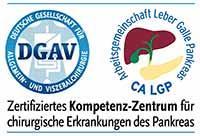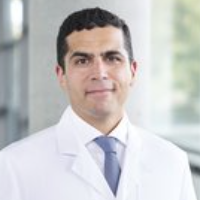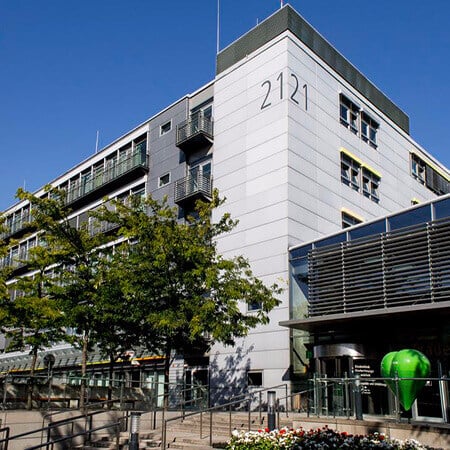Appendix Cancer — CRS and HIPEC - Hyperthermic Intraperitoneal Chemoperfusion: treatment in the Best Hospitals in the World
Treatment prices are regulated by national law of the corresponding countries, but can also include additional hospital coefficients. In order to receive the individual cost calculation, please send us the request and medical records.

Department of General, Abdominal, Transplant, Hepatopancreatobiliary, Colorectal, Endocrine, Bariatric Surgery and Hernia Surgery
The Department of General, Abdominal, Transplant, Hepatopancreatobiliary, Colorectal, Endocrine, Bariatric Surgery and Hernia Surgery provides the full range of services in the areas of its specialization and holds a leading position at the national and international levels in terms of the number of surgical interventions performed and their success. Of particular interest are operations for treating diseases of the bowel, stomach, esophagus, pancreas, liver, gallbladder, and bile ducts, and endocrine glands. The department's doctors have excellent skills in the surgical treatment of cancer, surgery for liver, kidney, pancreas, and small intestine transplants, and operations for morbid obesity. The department's operating rooms are the pride of the medical facility, since they have all the necessary technical options for performing operations with the da Vinci surgical system, image-guided interventions, and endoscopic surgical procedures, which are characterized by minimal trauma rates.







Department of General and Abdominal Surgery, Hepatopancreatobiliary Surgery, Colorectal Surgery, Endocrine Surgery, Hernia Surgery and Bariatric Surgery
The Department of General and Abdominal Surgery, Hepatopancreatobiliary Surgery, Colorectal Surgery, Endocrine Surgery, Hernia Surgery and Bariatric Surgery offers the full range of effective surgical treatments in accordance with modern medical standards. Operations of varying complexity are performed on the stomach, colon, pancreas, liver, gallbladder, bile ducts, rectum, thyroid gland, and parathyroid glands in the department's operating rooms every day. The department's primary focus is the surgical treatment of malignant gastrointestinal tumors. The medical facility is certified in this area by the German Cancer Society (DKG). The team of endocrine surgeons specializes in the treatment of diseases of the thyroid gland, parathyroid glands, and adrenal glands. Patients with morbid obesity are also successfully operated on here. In their work, the department’s specialists primarily use minimally invasive surgical techniques, which virtually eliminate trauma to healthy tissue during the intervention. The department's operating suite is equipped with an innovative da Vinci Surgical System, which allows the doctors to perform sparing and high-precision surgical interventions. The specialists of the medical facility strictly adhere to hygiene and safety standards and create the most comfortable conditions for each patient during their hospital stays.







Department of Abdominal and Colorectal Surgery, Hepatobiliary Surgery, Hernia Surgery, Bariatric Surgery, Endocrine Surgery, Thoracic and Vascular Surgery
The Department of Abdominal and Colorectal Surgery, Hepatobiliary Surgery, Hernia Surgery, Bariatric Surgery, Endocrine Surgery, Thoracic and Vascular Surgery offers the full range of services in these medical fields. It provides surgical treatment of diseases of the gastrointestinal tract, thyroid and parathyroid glands, thoracic organs, vascular system, rectum, anus and colon. In addition, the department performs bariatric interventions for the treatment of morbid obesity. A special focus is made on the treatment of gastrointestinal cancer. Minimally invasive surgical techniques are always preferred, if clinically indicated. The team of the department's surgeons has 8 progressive operating rooms equipped with everything necessary for successful treatment. The department also has the da Vinci Xi surgical system for high-precision minimally invasive robot-assisted interventions. The patient's health is in the safe hands of the best German surgeons who have gone through a rigorous selection and have vast clinical experience.






Appendix cancer is a rare type of oncological pathology. Less than 0.2-0.5% of malignant tumors of the digestive system account for appendix cancer. However, appendix tumors are characterized by a prolonged asymptomatic process of development and a high degree of malignancy.
Content
- Overview
- Symptoms
- Diagnostics
- Treatment
- Advantages of hyperthermic intraperitoneal chemotherapy (HIPEC)
- Where can I undergo CRS and HIPEC treatment abroad?
- The cost of treatment abroad
- How can I undergo CRS and HIPEC treatment abroad?
CRS is the removal of the primary tumor of the appendix, the affected areas of the peritoneum and lymph nodes, and resection of the affected abdominal and pelvic organs.
HIPEC is flushing the abdomen with a heated solution of high-dose chemotherapy following CRS.
For appendiceal cancer, CRS and HIPEC provide a 5-year survival rate of 74%. This means that two-thirds of people with advanced cancer will live more than 5 years after diagnosis.
The University Hospital of Ludwig Maximilian University of Munich, the Charite University Hospital Berlin and the University Hospital Ulm specialize in CRS and HIPEC.
The cost of the treatments ranges from 52,000 euros to 92,000 euros. On the Booking Health website you will find a list of specialized hospitals with current prices for the treatment.
Leave a request with up-to-date medical information on the Booking Health website and a medical advisor will contact you within 24 hours.
Overview
Appendix cancer is a slow-growing tumor that rarely reaches more than 2 cm in size. Appendix cancer is very difficult to detect at the early stages, so it is often detected already at 3-4 stages, when metastases to regional lymph nodes and liver, and occlusion of the appendix are observed. Appendix cancer in which the tumor grows rapidly and gives metastases to the pelvic organs is much less common. Cancer of the appendix is most often found during the surgical removal of the appendix.
The causes that would explain the development of the disease have not been determined yet. However, certain factors can influence the appendix cancer development such as pathologies of the enterochromaffin cells functioning (happens due to increased production of serotonin); vasculitis (inflammation in blood vessels); infections that lead to disruption of the gastrointestinal tract functioning; presence of toxins in the body.
There are different types of appendix cancer. For example, the primary appendix cancer is a very rare form of the disease. The more common type of appendix cancer is the carcinoid tumor of the appendix (55% of the total number of carcinoid tumors of the gastrointestinal tract).
Regardless of the type of tumor, with its growth the appendix also increases, and its lumen closes gradually. This leads to the development of acute appendicitis. In some cases, cancer of the appendix metastasizes to the lymph nodes and pelvic organs.
The symptoms in the carcinoid of the appendix arise when the carcinoid stimulates increased production of serotonin, and this leads to diarrhea, redness or cyanosis of the face, asthmatic attacks.
Symptoms
Like any other cancer, appendix cancer at its early stages is often asymptomatic.
At the initial stages of cancer, it is important to pay attention to the following health conditions arising:
- Feeling of discomfort in the lower right area of the abdomen
- Increase in the size of the abdomen
- Poor intestinal permeability
- Acute or chronic pain in the abdomen
It should also be taken into consideration that at the advanced stages of the disease the following symptoms may occur:
- Attacks of an asthmatic nature, which are represented by shortness of breath and difficulty breathing
- Sharp pain in the neck and face
- Palpable lump in the abdominal cavity
- Various complications in the functioning of the heart
Diagnostics
The appendix cancer diagnosis is made based on the specifics of the disease in patients and confirmed by the laboratory and instrumental studies that include:
- Ultrasound scanning. Today, an ultrasound is the most common method for diagnosing appendicitis. On ultrasound, the inflamed appendix can be seen very well, whereas in a healthy condition it is difficult to see this organ. Besides, the ultrasound scanning will show fluid accumulation around the inflamed appendix.
- X-ray examination. In recent years, it is rarely performed and mainly used for revealing inflammation of the appendix in children.
- CT scan.
- Diagnostic laparoscopy.
- Tests of urine and blood. Tests of urine and blood are used as additional diagnostic methods.
Treatment
The common method of appendix cancer treatment, when the tumor has grown and metastasized, includes surgery that is usually supplemented with radiation or chemotherapy. At the best hospitals in the world, such chemotherapy method as HIPEC is successfully used.
HIPEC, hyperthermic intraperitoneal chemotherapy, is a method of treating oncological diseases of the organs of the abdominal cavity, even if it is a disease of advanced stage, with numerous metastases.
The HIPEC procedure is used after cytoreductive surgery. Cytoreductive surgery is a surgical method of treatment that involves partial or complete removal of the tumor. Cytoreductive surgery can be performed both after chemotherapy and before it. Often, such surgery is the only method of treating inoperable tumors. It gives a chance to increase the sensitivity of the tumor to the subsequent course of hyperthermic intraperitoneal chemotherapy (HIPEC). Combining cytoreductive surgery with intraperitoneal chemotherapy HIPEC, doctors manage to achieve success in the treatment of appendix cancer patients, even in the most severe cases.
Once all visible neoplasms and suspicious tissues are removed by surgery, a special sterile solution of chemotherapy drugs is injected into the abdominal cavity in compliance with the high-temperature regimen. This feature of the HIPEC allows treating patients with inoperable neoplasms or hard-to-reach neoplasms. HIPEC also effectively destroys the remnants of previously removed tumors, even if the residual mass consists of microscopic cells. HIPEC is an effective procedure for patients with cancer that has metastasized to the abdominal cavity (carcinomatosis).
After performing cytoreductive surgery during which all visible tumor loci are removed, doctors begin the HIPEC procedure. A solution of chemotherapy agents (usually cisplatin, oxaliplatin, etc.) is warmed to a certain temperature (usually 40-42 degrees Celsius), which is higher than body temperature, and is injected into the abdominal cavity. It is this temperature that is sufficient to destroy malignant cells effectively. The solution is injected locally and for a short time. Therefore, HIPEC is much better tolerated than systemic chemotherapy. The solution stays in the abdominal cavity for 60-90 minutes, then it is removed, and the incision is sutured. This procedure kills all invisible cancer cells by delivering a high concentration of chemotherapy drugs directly to the area of tumor removal. Doctors can locally act on the tumor with high doses of drugs that are generally deadly if used in intravenous chemotherapy techniques. The drugs are not absorbed by the body, and therefore HIPEC does not cause side effects associated with conventional chemotherapy.
Advantages of hyperthermic intraperitoneal chemotherapy (HIPEC)
Advantages of the hyperthermic intraperitoneal chemotherapy (HIPEC) include:
- Effectively killing abnormal cells without harming healthy tissues
- Using highly concentrated substances exactly where they are needed – sparing healthy vital organs
- The ability to destroy invisible cancer cells in the tissues of the abdominal organs
- The high temperature helps the chemotherapy penetrate deeper into the tissues and kill the invisible remnants of the tumor
- The ability to use high doses of chemotherapy drugs, which is not possible with conventional chemotherapy
- Unlike classical chemotherapy, hyperthermic intraperitoneal chemotherapy (HIPEC) is performed once
- High-temperature chemotherapy is metabolized differently, which leads to avoiding the usual chemotherapy side effects
- The ability to achieve the desired therapeutic effect quickly
Where can I undergo CRS and HIPEC treatment abroad?
Health tourism is becoming more and more popular these days, as medicine abroad often ensures a much better quality of appendix cancer treatment.
The following hospitals show the best success rates in appendix cancer treatment with cytoreductive surgery and HIPEC:
- University Hospital of Ludwig Maximilian University of Munich, Germany
- Charite University Hospital Berlin, Germany
- University Hospital Ulm, Germany
- Tel Aviv Sourasky Medical Center, Israel
- University Hospital Carl Gustav Carus Dresden, Germany
You can find more information about the hospitals on the Booking Health website.
The cost of treatment abroad
The prices in hospitals listed on the Booking Health website are relatively low. With Booking Health, you can undergo appendix cancer treatment with CRS and HIPEC at an affordable price.
The cost of treatment varies, as the price depends on the hospital, the specifics of the disease, and the complexity of its treatment.
The cost of treatment of appendix cancer with HIPEC and CRS in Germany is 38,050-67,555 EUR.
The cost of treatment of appendix cancer with HIPEC and CRS in Israel is approximately 40,982 EUR.
You might want to consider the cost of possible additional procedures and follow-up care. Therefore, the ultimate cost of treatment may differ from the initial price.
To make sure that the overall cost of treatment is suitable for you, contact us by leaving the request on the Booking Health website.
How can I undergo CRS and HIPEC treatment abroad?
It is not easy to self-organize any treatment abroad. It requires certain knowledge and expertise. Thus, it is safer, easier, and less stressful to use the services of a medical tourism agency.
As the largest and most transparent medical tourism agency in the world, Booking Health has up-to-date information about cancer treatment with CRS and HIPEC in the best hospitals. We will help you select the right clinic taking into account your wishes for treatment.
We want to help you and take on all the troubles. You can be free of unnecessary stress, while Booking Health takes care of all organizational issues regarding the treatment. Our services are aimed at undergoing appendix cancer treatment with cytoreductive surgery and HIPEC safely and successfully.
Medical tourism can be easy! All you need to do is to leave a request on the Booking Health website, and our manager will contact you shortly.
Authors:
The article was edited by medical experts, board-certified doctors Dr. Vadim Zhiliuk and Dr. Nadezhda Ivanisova. For the treatment of the conditions referred to in the article, you must consult a doctor; the information in the article is not intended for self-medication!
Sources:

